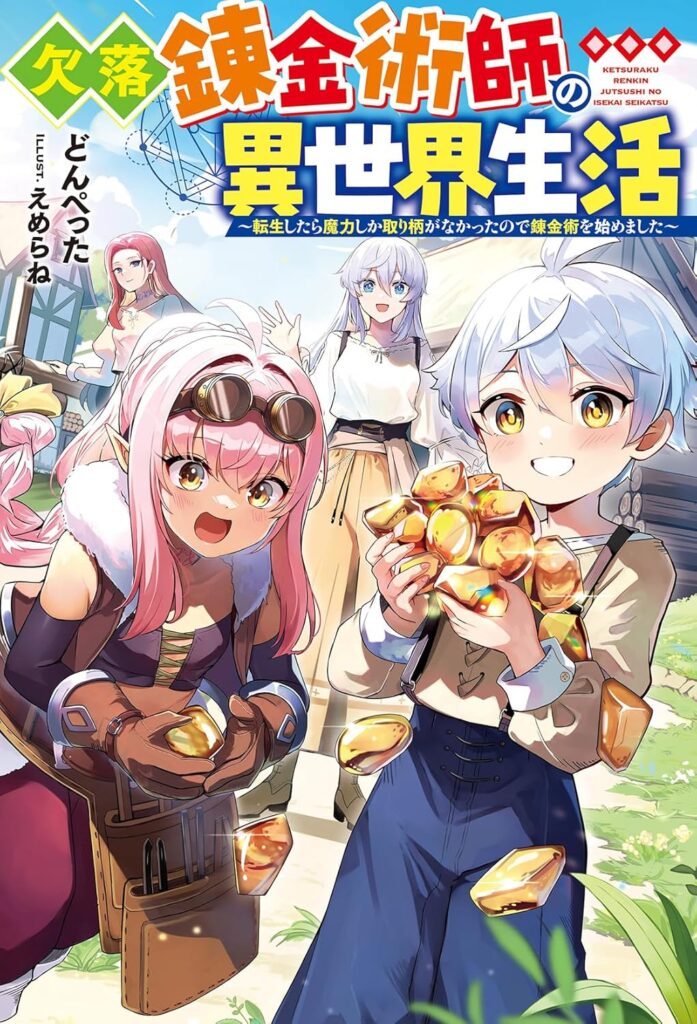
Kays Translations
Just another Isekai Lover~
Chapter 14: Negotiation: Tounis
We had been waiting in the reception room for an hour when Tobias returned, escorting Tounis-san with him.
“Thank you for waiting. I’ve brought my father,” Tobias announced casually.
“—Tobias, do not make such flippant remarks during negotiations,” came the sharp rebuke immediately.
“…Yes. My apologies,” Tobias replied, his shoulders slumping.
Even as he was scolded the moment he returned, it was somehow reassuring—Tobias had not changed a bit.
Mother rose, instinctively, but Tounis-san gestured with a calm hand to keep her seated. “Stay as you are,” he said, then lowered himself gracefully onto the sofa.
“I sincerely apologize for repeatedly taking up your precious time, Your Excellency,” mother began.
“I did not expect that we would meet again so soon, following yesterday,” Tounis replied with a hint of dry humor beneath his composed exterior.
Though the Baron Merlot family were minor nobility, as landowners they carried a certain gravitas. Tounis, in particular, exuded the unmistakable air of a ruler.
“First, I would like to understand why a child is present at this negotiation,” he said, his voice calm but probing.
It dawned on me that in the rush to discuss the glass, I had never explained to Tobias why I had come here in the first place.
“It’s because this child was in danger of being harmed,” mother answered firmly.
“Danger?”
We recounted the events of today to the two of them, explaining every detail carefully.
“…I see. It could sound like a threat, yet it could also be interpreted as advice for the sake of safety,” Tounis mused.
“Yes. The presence of a bodyguard could be construed in many ways,” mother added.
I understood their point, but I had insisted on leaving before things got truly dangerous, fearing that lingering too long would allow them to corner me. Besides, they likely did not suspect me of being an alchemist, so I knew they would not anticipate reckless moves from me.
I could have sold the information about the alchemist in place of the glasses, but they would not have guessed that I held it. Selling information to someone prone to intimidation would have been far too risky.
The biggest issue was the bodyguard. If they had come all the way to the inn, our location would have been known, leaving us vulnerable—“attacked at any time” vulnerable.
The thought sent shivers down my spine again. Mother noticed and gently took my hand. A little embarrassing, yes, but also comforting. I allowed myself a small sigh.
“That alone accomplishes nothing,” Tounis said.
“That is acceptable. However, a trading company that makes such threats is not to be trusted. Rather than hand over the information that caused this trouble to that company, or hoard it ourselves, we decided it would be best to entrust it to someone else,” mother explained calmly.
If the information had already reached a third party, the Opsidio Trading Company would likely back down. And if that third party were nobility, they would have little room to act aggressively.
“Couldn’t it have been another trading company?” Tobias asked.
“That may have been an option,” mother admitted. “But in the worst case, there could still be an attack. That’s why we sought someone more secure—Your Excellency.”
As expected of her, mother had taken my impulsive plan and shaped it into something coherent.
“I see. I understand the general situation. Tobias has told me the information pertains to glass. But what, specifically, does it involve?” Tounis asked.
Mother hesitated briefly, then produced a wine glass to illustrate her explanation.
There were three types of wine glasses. The cheapest were made from silica sand, not perfectly clear, slightly tinted, and affordable for ordinary people at five silver coins. The mid-range glasses used fragments of quartz, uncolored but cloudy, sold for two gold coins, typically for minor nobles or wealthy merchants. The finest glasses, for upper nobility, were crafted only from the purest parts of quartz, free from impurities, priced at five gold coins or more.
Yet, the information we possessed could allow production of the highest-grade glasses for less than one gold coin.
“So, one glass could yield a profit of over four gold coins?” Tobias asked.
“That is possible, but if profit alone guides your actions, it can breed resentment,” mother warned.
Even if sold at the same price, each piece would generate significant profit—but glassmakers already had an established clientele, making sales difficult. Selling cheaply would drive other workshops to bankruptcy.
“And your plan, then?” Tounis asked.
“First, we sell the raw glass,” mother replied.
“…Excuse me?”
Both Tounis and Tobias tilted their heads in confusion—an expression I found far from appealing.
“Cough… We take silica sand, remove impurities, and produce transparent glass blocks, then sell these as raw materials to other glassmakers,” she clarified.
High-quality glass products rely on the clearest quartz crystals. By providing purified transparent glass blocks, each workshop could produce top-tier products at lower cost. This avoids provoking resentment from existing glassmakers.
“And what of producing glassware ourselves?” Tounis asked.
“We will, but only after we distribute the raw glass,” mother replied. “No need to create unnecessary enmity. The profit alone is already substantial.”
We had likely already earned the Opsidio Company’s ire; we didn’t need to add more enemies.
“That is true. There is no need to earn resentment for profit alone,” Tounis admitted.
“Yes. But this is not the only source of profit,” mother added.
“Another source?”
“This child was targeted for a different reason altogether,” she said, pulling a pair of glasses from a case she had received from Rugena and presenting them to Tounis.
“These?”
“These are spectacles. They do not compete with other glassmakers and can be produced and sold immediately,” she explained, detailing their usefulness. While Rugena used goggles in combat, spectacles served a practical purpose.
“I see… the dwarf wears them because of poor eyesight, then.”
“Yes. Though a universal remedy could restore sight, the cost would be prohibitive.”
This remedy was a rare alchemical concoction, available only to a few and prohibitively expensive—over ten platinum coins. By contrast, spectacles could be crafted for about two gold coins, depending on the method.
“There are also other products that use lenses,” mother added.
“I understand…” Tounis murmured thoughtfully.
If we were selling to the Opsidio Company, the spectacle information alone would suffice. But as the Baron’s family were nobility, not craftsmen or merchants, we had to teach them the glass-making process itself to fully utilize lens technology.
The two men leaned back in their chairs, absorbed in thought. Though they understood investment and profit, they could not be certain—the core technique remained unexplained.
Tounis crossed his arms, pondering deeply, then finally straightened, meeting mother’s gaze.
“I cannot prepare it immediately, but I can arrange forty platinum coins,” he said.
“Then…”
“Yes. I will accept this proposal,” he confirmed.
Relieved, I thought. This gave us a pretext to refuse the Opsidio Company. There might be some lingering resentment, but nobility would not resort to drastic measures.
“And the contract?”
“Before that, I would like to settle profit distribution.”
The arrangement: the Baron’s family would receive 90% of the profit for handling production, while we would receive 10% as an information fee. This distribution would last thirty years, after which the barons would claim full profit.
“…Are you sure about this, Miss Martine?” Tounis asked.
Typically, teaching production methods would require a fixed fee or around 30% of profits. He likely perceived our negotiation as weak. But this was intentional: we reduced our share to protect the information source and gain favor with the Baron’s family. In exchange, we requested two additional favors.
“In return, there are two more things I desire,” mother said.
“You mentioned a recommendation letter?”
“Yes, but also two more: usage rights for the Helvendorp forge, and… Stefana.”
I had assumed we could simply ask the village head for the forge, but apparently it was under the Baron’s jurisdiction. The other request—mother wanting Stefana—was… delicate.
“The forge is acceptable, but… Stefana, you say?”
“Is that impossible?” mother asked gently.
Tounis considered Stefana for a long moment.
“Miss Martine knows the circumstances of Stefana?”
“…!”
At Tounis’s words, Stefana lowered her eyes and remained silent. Neither mother nor I knew her full story. As Tounis’s slave, we had refrained from asking.
